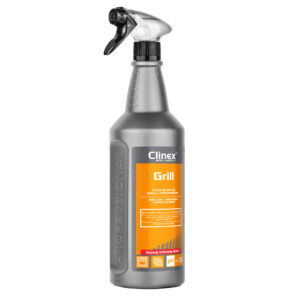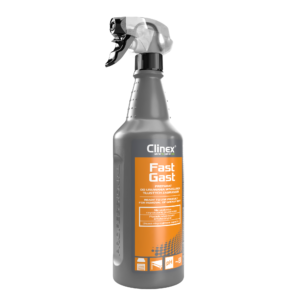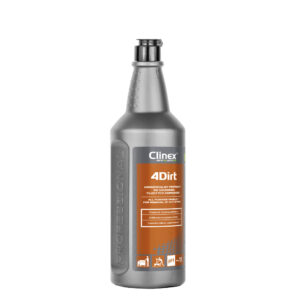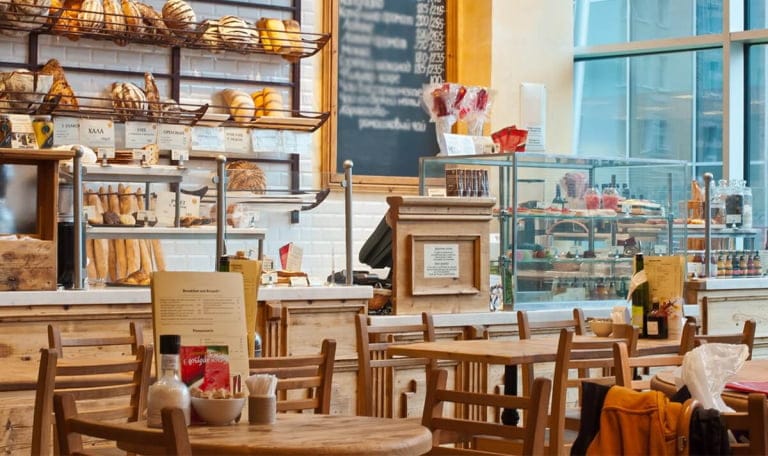Cleanliness in a restaurant kitchen is of great importance. How to take care of it? Which aspects of maintaining cleanliness in the kitchen are the most important?
From this article you will learn:
- How important is hygiene in a restaurant kitchen;
- What activities are key to ongoing cleanliness maintenance;
- How to properly clean surfaces and equipment;
- How to store products in a safe and hygienic way;
- How to choose cleaning products for the catering industry.
Why is hygiene in a restaurant kitchen crucial?
Cleanliness in a catering kitchen is an absolute must. Proper hygiene not only ensures food safety, but also helps build the image of the restaurant. Customers expect food to be prepared in conditions that meet the highest sanitary and epidemiological standards. Maintaining cleanliness in the kitchen is also important from the point of view of regulations. Failure to comply with hygiene obligations may lead to financial penalties and, in extreme cases, even closure of the premises.

Daily duties – how to keep things clean on an ongoing basis?
The key to maintaining cleanliness in a restaurant kitchen is its ongoing cleaning. Just as important as daily cleaning is a thorough cleaning, which should be done at least once a month. Daily duties should include:
- washing work surfaces : after each work (especially after preparing raw meat or fish), the kitchen should be cleaned and disinfected – countertops, chopping boards and other surfaces. In this case, Clinex DezoFast will work perfectly – an alcohol-free preparation with both cleaning and disinfecting properties. For disinfection to be effective, the required contact time of the agent with the surface should always be observed, according to the manufacturer’s label. Then the surface should be neutralized, i.e. rinsed thoroughly with clean, drinking water.
- For everyday cleaning of places exposed to greasy dirt, it is worth reaching for Clinex FastGast . This ready-to-use preparation, thanks to its excellent ability to emulsify fat, easily dissolves strong and persistent oil and grease dirt and burnt food residues, without leaving streaks or smudges on the cleaned surfaces. For removing greasy dirt from floors, we recommend Clinex 4Dirt ;
- cleaning kitchen equipment : pots, pans, knives and other accessories must be thoroughly cleaned of dirt.
- keeping cabinets and drawers tidy : regularly tidying up cabinets and cubbies and putting away equipment makes it easier to find the utensils you need at a given moment. It also prevents the accumulation of food residues, which can become a breeding ground for bacteria;
- washing additional accessories : all accessories in the kitchen require regular washing. If, for example, LCD screens are used to manage orders, it is worth using a dedicated agent – Clinex LCD ;
- air conditioning cleaning : if the restaurant kitchen has air conditioning, it also requires regular cleaning, as it can be a source of pathogenic microorganisms and allergens. In this case, we recommend using the Clinex Nano Protect Silver Nice air conditioning disinfectant . The filters in the hoods also require regular cleaning to ensure they work efficiently and fulfill their task.

Kitchen equipment and work surfaces – how to clean them properly?
Kitchen equipment and work surfaces require special attention and care. Regular cleaning helps avoid cross-contamination. It is best to use specialist food-grade cleaning agents to clean work surfaces and kitchen equipment.
From the point of view of cleanliness in a catering kitchen, the most important thing is the worktops. They should be cleaned and disinfected after each use. Stainless steel worktops work best in catering kitchens. They are easy to keep clean and resistant to scratches, which can accumulate food residues and pathogenic microorganisms. The same applies to knives and dishes. These should be washed in a dishwasher with a sterilization function. If hand washing is recommended, it is worth paying attention to whether the agent is not only effective, but also safe for the skin. These requirements are met by Clinex HandWash Balsam , which not only effectively removes grease and dirt from dishes, but thanks to the content of aloe extract and glycerine – protects and moisturizes the skin of the hands.
Cleaning a restaurant kitchen should also include systematic descaling of water heaters and other devices that come into contact with water. For this purpose, you can use a strong and effective agent, such as Clinex Destoner Forte . This preparation effectively removes the most persistent lime and mineral deposits, which allows kitchen devices such as catering dishwashers and steamers to operate properly. The frequency of descaling should be adjusted to the degree of water hardness. For devices such as coffee machines or kettles, we recommend the product Destoner .

Safe food storage and keeping order
Kitchen hygiene largely depends on the conditions in which food is stored. This applies primarily to raw products – meat, fish, seafood, fruit and vegetables. Special attention should be paid to the appropriate temperatures – to prevent the growth of bacteria and mould. Freezers and refrigerators must also be regularly cleaned and disinfected according to a set schedule.
Safe food storage requires separating raw products from ready meals. This prevents contamination of ready meals with pathogens from raw ingredients. It is also important to use appropriate containers for storing individual ingredients. They should be easy to clean and tightly closed – then they will prevent the penetration of odors and ensure the high quality of prepared dishes.
Professional cleaning products – which ones are worth using?
High hygiene standards in gastronomy cannot be maintained without professional cleaning agents, these can be found in the Clinex offer – in the category of kitchens and devices . These should be preparations intended for gastronomy, ensuring effective removal of fat, dirt and bacteria, and at the same time safe for health and not affecting the taste of dishes. Professional chemicals are characterized by higher effectiveness and efficiency compared to generally available agents, which is confirmed in practice. However, the right selection of the preparation for the type of surface being cleaned and the specificity of the dirt is crucial. It is also extremely important to use the agents in accordance with the manufacturer’s recommendations in order to ensure maximum effectiveness and safety.
Clinex Grill is perfect for cleaning ovens and grills, which, thanks to its foam formula and strong concentration of ingredients, effectively removes baked-on dirt. However, it should be remembered that this is a preparation intended for thorough cleaning, not everyday use. When it comes to washing convection-steam and smokehouse ovens, it is worth reaching for Clinex Smog , which is highly effective in removing soot and smoke odors. To clean accumulated oil dirt on walls, ceilings or floors, it is worth using Clinex Anti-Oil, which has very strong degreasing properties.
In a restaurant kitchen, cleaning kitchen siphons is equally important. We recommend using the Clinex Drill unclogging agent, which, thanks to its gel formula, effectively settles on the walls of the pipes and dissolves all kinds of solid and organic impurities, such as grease, kitchen waste or soaps, eliminating unpleasant odours and ensuring long-lasting effect. The choice of dishwashing agents and kitchen utensils also requires attention. Clinex’s offer includes a wide selection of dishwasher agents – e.g. Clinex DiShine and Clinex DiShine Premium rinse aids, Clinex DishGlass glassware cleaner and versatile Clinex DishWash and Clinex DishWash Premium agents.

Basic kitchen hygiene and good staff practices
The hygiene of kitchen staff is just as important as maintaining the cleanliness of equipment, utensils and dishes. Employees and management should adhere to several basic rules above all:
- regular hand washing : employees must wash their hands before and after contact with food, after using the toilet and after working with raw products; it is also worth using a hand sanitiser, e.g. Clinex DEZOSept ;
- wearing appropriate work clothes : cooks should wear clean aprons, caps and protective gloves;
- Health check : people with symptoms of infection are not allowed to work in the kitchen.
Sanitary regulations and audits – how to meet hygiene requirements?
Every restaurant kitchen has sanitary and epidemiological regulations that must be strictly observed. The Sanitary Inspectorate requires catering establishments to meet rigorous hygiene standards. Regular audits and inspections will help assess whether all standards are met. It is also worth investing in the preparation of HACCP and GHP/GMP documentation, which specify in detail the processes related to sanitary standards in gastronomy – food safety and hygiene in the catering establishment.
We encourage you to generate your own individual restaurant kitchen hygiene plan , which will systematize cleaning activities, help keep it clean and guarantee high quality of catering services provided. In summary – maintaining cleanliness and order in a restaurant kitchen requires systematicity and attention to every detail. Regular cleaning, proper storage of food, appropriate cleaning agents, as well as compliance with hygiene rules by staff are actions that will ensure high quality of the restaurant and safety of guests.
FAQ – Frequently asked questions about maintaining cleanliness in a catering kitchen
Hygiene in a catering kitchen has a direct impact on food safety, guest health and the image of the restaurant. It is also very important from the perspective of sanitary and epidemiological regulations.
What activities should you do every day to keep your kitchen clean?
Daily cleaning is required primarily for countertops and other work surfaces, as well as kitchen equipment and utensils. Don’t forget to regularly tidy up cabinets and disinfect frequently touched items.
What cleaning products work best in the catering industry?
It is worth choosing specialist catering agents that effectively remove typical kitchen stains.
How to store food hygienically?
Products should be stored at appropriate temperatures, in tight and easy-to-clean containers, with the principle of separating raw semi-finished products from finished meals.
How to ensure the hygiene of kitchen staff?
The most important thing is to wash your hands regularly, wear clean work clothes, use gloves and monitor the health of your employees.









